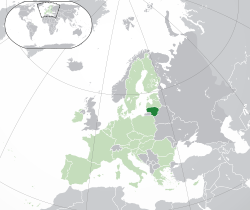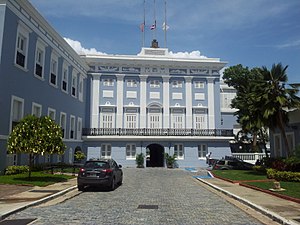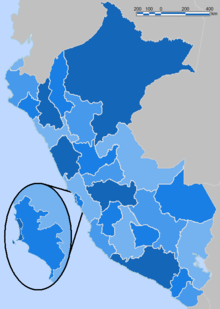| Main | Topics and categories | Tasks and projects |
The Politics portal
Politics (from Ancient Greek πολιτικά (politiká) 'affairs of the cities') is the set of activities that are associated with making decisions in groups, or other forms of power relations among individuals, such as the distribution of status or resources. The branch of social science that studies politics and government is referred to as political science.
Politics may be used positively in the context of a "political solution" which is compromising and non-violent, or descriptively as "the art or science of government", but the word often also carries a negative connotation. The concept has been defined in various ways, and different approaches have fundamentally differing views on whether it should be used extensively or in a limited way, empirically or normatively, and on whether conflict or co-operation is more essential to it.
A variety of methods are deployed in politics, which include promoting one's own political views among people, negotiation with other political subjects, making laws, and exercising internal and external force, including warfare against adversaries. Politics is exercised on a wide range of social levels, from clans and tribes of traditional societies, through modern local governments, companies and institutions up to sovereign states, to the international level.
In modern nation states, people often form political parties to represent their ideas. Members of a party often agree to take the same position on many issues and agree to support the same changes to law and the same leaders. An election is usually a competition between different parties.
A political system is a framework which defines acceptable political methods within a society. The history of political thought can be traced back to early antiquity, with seminal works such as Plato's Republic, Aristotle's Politics, Confucius's political manuscripts and Chanakya's Arthashastra. (Full article...)
Selected article

The Han dynasty (202 BC – 220 AD) was the second imperial dynasty of China, following the Qin dynasty (221–207 BC). It was divided into the periods of Western (Former) Han (202 BC – 9 AD) and Eastern (Later) Han (25–220 AD), briefly interrupted by the Xin dynasty (9–23 AD) of Wang Mang. The capital of Western Han was Chang'an, and the capital of Eastern Han was Luoyang. The emperor headed the government, promulgating all written laws, serving as commander-in-chief of the armed forces, and presiding as the chief executive official. He appointed all government officials who earned a salary of 600 bushels of grain or more (though these salaries were largely paid in coin cash) with the help of advisors who reviewed each nominee. The empress dowager could either be the emperor's actual or symbolic mother, and was in practice more respected than the emperor, as she could override his decisions; she can even make decisions on behalf of the emperor in dilemma matters of the country or for the order and continuation of the dynasty, even if necessary, with the support of the courtiers, she would decide on his successor or his dismissal. Although such a challenge was raised by the empress dowager to the emperor during the emperor's youth or incapacity. The emperor's executive powers could also be practiced by any official upon whom he bestowed the Staff of Authority. These powers included the right to execute criminals without the imperial court's permission.
Featured picture

Dilma Rousseff served as the 36th President of Brazil from 2011 until her impeachment in 2016. This is her official photograph on taking up the presidency.
Selected quote
Selected biography
Phạm Ngọc Thảo (1922–1965), a major provincial leader in South Vietnam and infiltrator of the Army of the Republic of Vietnam (ARVN), was a communist agent of the Viet Minh and later the Vietnam People's Army. As the overseer of Ngô Đình Nhu's Strategic Hamlet Program in the early 1960s, he deliberately forced the program forward at unsustainable speeds, constructing poorly equipped and poorly defended villages, in order to foster rural resentment against the regime of President Ngo Dinh Diem, Nhu's elder brother. Thao was posthumously promoted by the ARVN to the rank of one-star general and awarded the title of Heroic war dead (Vietnamese: Liệt sĩ). After the Fall of Saigon and the end of the Vietnam War, the communist government awarded him the same title and paid war pensions to his family, claiming him as one of their own.
Did you know (auto-generated) -

- ... that politics in The Simpsons have caused controversy in Argentina, Australia, Brazil, and Japan?
- ... that the ideas of Albert Schädler became the founding ideas of the Progressive Citizens' Party, though he himself was opposed to the formation of political parties?
- ... that nearing the end of his tenure as mayor of Tegal, Indonesia, Adi Winarso took part in a talkshow with his former political competitors?
- ... that despite entering politics as part of a right-wing party, Betty Tejada was later elected president of the Chamber of Deputies as a member of the Movement for Socialism?
- ... that Nobel laureate Thomas Mann reportedly did not want his Reflections of a Nonpolitical Man to be translated into English during his lifetime due to its chauvinistic content?
- ... that Disney once created a political advertisement for Dwight D. Eisenhower (featured)?
More did you know...
- ...that Republican National Committee official Rob Bickhart wrote a PowerPoint presentation for a meeting of Republican fundraisers which depicted Nancy Pelosi as Cruella de Vil?
- ...that following its 1994 national convention, the Progress Party of Norway lost its deputy leader and the four MPs Christiansen, Hillgaar, Wetterstad and Bråthen?
- ...that Democrat Mayor Thomas G. Dunn, national co-chairman of Democrats for Nixon, was "read out of the party" for his support of Republican President Richard Nixon's 1972 re-election bid?
- ...that the National Assembly of Azerbaijan was the first secular republican parliament in the Muslim world?
- ...that in world-system theory, sociologists debate whether two world-systems have ever existed during the same period?
- ...that former Republican California State Senator Becky Morgan served on the Board of Trustees of both her alma maters, Stanford University and Cornell University?
- ...that Nunez Community College in Chalmette, Louisiana, is named for the late wife of former Louisiana State Senate President Samuel B. Nunez, Jr.?
- ...that the Proletarian Revolutionary Organisation of Nepal proposed a synthesis of Buddhism and Maoism in 1977?
In this month
- October 1, 1949 – The People's Republic of China is officially proclaimed.
- October 1, 1982 – Helmut Kohl, described as "the greatest European leader of the second half of the 20th century" by George H. W. Bush and Bill Clinton, is elected Chancellor of Germany.
- October 4, 1849 – Official founding of the Colombian Conservative Party.
- October 7, 1949 – The Democratic Republic of Germany DDR is established officially.
- October 7, 2003 – Voters recall Governor Gray Davis from office and elect actor Arnold Schwarzenegger to succeed him.
- October 10, 1911 – The Wuchang Uprising starts the Xinhai Revolution that leads to the founding of the Republic of China.
- October 10, 1919 – The Kuomintang of China was founded.
- October 27, 2005 – The political establishment in France is rocked by the spread of rioting among poor immigrant communities in suburbs of the major cities.
News and Current events
- August 11: 4 local government areas in New South Wales, Australia locked down after COVID-19 case
- August 11: Australia: AstraZeneca vaccine access expanded by Victorian government
- August 1: Australia: Victorian lockdown lifted
- July 29: Tunisia's president dismisses prime minister, suspends parliament
- July 25: Australia: Wikinews interviews Reg Kidd, mayor of the City of Orange, about COVID-19 lockdown and local government
- July 23: South Australia enters week-long lockdown to contain COVID-19 Delta variant spread
- July 21: Technological University Dublin senior lecturer Dr Lorcan Sirr speaks to Wikinews on housing market in Ireland
- July 21: Three rural councils in New South Wales, Australia enter 7-day lockdown
- July 21: Australia: Victoria lockdown extended by a week with 85 active cases recorded
- July 15: California governor signs new state budget, eligible Californians to get stimulus payments
Topics and categories
General images
Related portals
Associated Wikimedia
The following Wikimedia Foundation sister projects provide more on this subject:
-
Commons
Free media repository -
Wikibooks
Free textbooks and manuals -
Wikidata
Free knowledge base -
Wikinews
Free-content news -
Wikiquote
Collection of quotations -
Wikisource
Free-content library -
Wikiversity
Free learning tools -
Wiktionary
Dictionary and thesaurus


























































